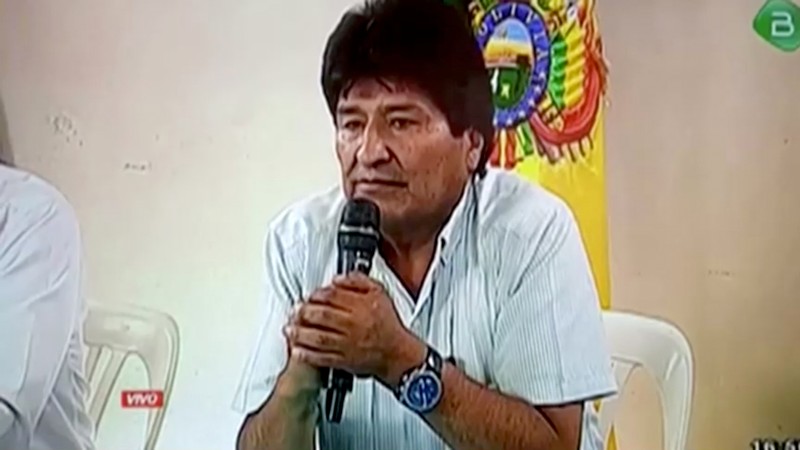
Bolivia’s President Evo Morales annouces his resignation in Lauca N, Cochabamba, Bolivia November 10, 2019 in this still image taken from Bolivian Government TV. Bolivian Government TV via REUTERS TV
November 11, 2019
By Angus Berwick
CARACAS (Reuters) – The resignation of Bolivian President Evo Morales, the last serving member of the ‘pink tide’ of leftist leaders that swept Latin America two decades ago, polarized governments across the region on Sunday, with presidents from Venezuela to Argentina denouncing a “coup” and others cheering his exit.
Morales, Bolivia’s first indigenous leader, ended his 14-year rule after allies deserted him following weeks of protests over a disputed Oct. 20 election that has roiled the Andean nation. On Sunday, the Bolivian military and key political backers called on him to step down.
Right-leaning governments in Latin America, among them Colombia and Peru, called on the Bolivian state to ensure new elections would be lawful. Brazil, under far-right nationalist Jair Bolsonaro, went further and welcomed Morales’ fall.
Meanwhile, embattled Venezuelan President Nicolas Maduro, whose socialist predecessor Hugo Chavez served as a sometime mentor to Morales, told allies to mobilize in support of Morales.
“We have to take care of our brother Evo Morales,” Maduro said in a recording broadcast on Venezuelan state television. “We must declare a vigil in solidarity to protect him.”
Maduro’s position has been bolstered by the return of left-leaning leaders in Mexico and Argentina. But Morales’ resignation could unnerve the Venezuelan leader, who has clung to power this year despite an opposition campaign to convince the armed forces to rebel.
Cuban President Miguel Diaz-Canel, another longtime Morales ally, tweeted his “solidarity” and said: “The world must be mobilized for the life and freedom of Evo.”
Mexico’s government rejected what it called a military operation under way in Bolivia, adding that there must be “no coup.” Mexico could offer asylum to Morales if he sought it, Foreign Minister Marcelo Ebrard said on Twitter, though there was no immediate claim.
And Argentine President-elect Alberto Fernandez, who won a landslide election victory last month in Latin America’s third-largest economy, said “the institutional breakdown in Bolivia is unacceptable.”
Morales agreed on Sunday to hold new elections after a report from the Organization of American States (OAS), which conducted an audit of the Oct. 20 vote, revealed serious irregularities in the ballot.
The OAS report said the October vote should be annulled after it had found “clear manipulations” of the voting system that called into question Morales’ win, with a lead of just over 10 points over main rival Carlos Mesa.
Brazil’s government said it would back a democratic transition in neighboring Bolivia and dismissed leftists’ argument that a coup had occurred.
“The massive electoral fraud attempt delegitimized Evo Morales, who had the right attitude and resigned in the face of popular outcry. Brazil will support a democratic and constitutional transition,” Brazilian Foreign Minister Ernesto Araujo said in a tweet.
The Colombian Foreign Ministry also called on Bolivian state institutions and political parties to work together to “ensure that Bolivian citizens can express themselves freely at the polls.” It requested a meeting of the OAS’ permanent council to discuss the situation.
Morales became president in 2006, joining Chavez, Argentina’s Nestor Kirchner and Brazil’s Luiz Inacio Lula da Silva in a left-wing surge across the continent that refashioned state institutions and polarized domestic politics.
The end of a long commodities boom in Latin America saw some left-leaning governments replaced by conservative administrations.
However, since last year, anger at corruption, inequality and poverty has pushed conservatives out in Mexico and Argentina, while fueling protests in recent weeks that forced governments in Ecuador and Chile to water down liberal economic policies.
(Reporting by Angus Berwick in Caracas, Adam Jourdan in Buenos Aires, Marco Aquino in Lima, Sharay Angulo in Mexico City, Julia Symmes Cobb in Bogota, and Anthony Boadle in Brasilia; writing by Angus Berwick; Editing by Paul Simao, Daniel Wallis and Richard Pullin)

